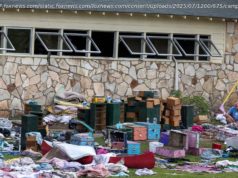First Sgt. Ma’ arik al-Tawayha had said that he thought he was under attack when he opened fire on an American convoy at an air base in Jordan last year.
A Jordanian soldier was convicted of murder and sentenced to life in prison on Monday for the deaths of three United States soldiers whom he shot at an air base in November.
The soldier, First Sgt. Ma’ arik al-Tawayha, 39, had pleaded not guilty, saying that he opened fire because the Americans had failed to stop their car as they approached the gate of the air base, and that he thought the base was under attack. “I was doing my job, ” he said as he was led from the courtroom.
Although Jordanian officials initially believed his account — angering their American counterparts — they later backed away from it, and charged Sergeant Tawayha with premeditated murder.
The trial, which lasted more than a month, did not establish a motive for the killings, but Jordanian officials said there was no evidence that Sergeant Tawayha had ties to extremist groups. The F. B. I. has opened an investigation into the case, as is common in matters that potentially involve terrorism.
The victims — Staff Sgt. Matthew C. Lewellen, 27, of Kirksville, Mo.; Staff Sgt. Kevin J. McEnroe, 30, of Tucson; and Staff Sgt. James F. Moriarty, 27, of Kerrville, Tex. — were killed shortly before noon on Nov. 4.
They were part of a four-vehicle convoy returning to the King Faisal air base outside the southern town of Al Jafr, after conducting weapons training at a nearby range, according to a United States military investigation that was completed March 7.
As the soldiers waited outside a gate to the base, Sergeant Tawayha opened fire with his M-16 rifle, killing Sergeant McEnroe and mortally wounding Sergeant Lewellen, who were both in the second vehicle of the convoy.
Sergeant Moriarty and another soldier got out of other vehicles and sought cover, according to the investigation. They tried to make clear that they were not a threat, but when the shooting continued, they returned fire. Sergeant Moriarty was fatally injured after he and Sergeant Tawayha exchanged fire. The fourth soldier, who survived, shot and seriously wounded Sergeant Tawayha.
The investigation concluded that the three soldiers “were properly trained, equipped and armed” and had been following “established procedures for entering the gate.” It found “no evidence that substantiates post-incident allegations and speculation that alcohol was involved, ” and no evidence that “the Americans were the first ones to fire their weapons.”
Video footage of the firefight has been shown to the bereaved relatives, but not released to the public. The relatives said the video showed that the gunfight lasted about six minutes and that Sergeant Tawayha reloaded and opened fire, even though the Americans waved and yelled: “We’ re Americans! We’ re friendly.”
In an open letter on Monday to Jordan ’s ambassador to the United States, Sergeant Moriarty’s father, James R. Moriarty, who is a lawyer in Houston, called the conviction “a good first step” but said that the victims’ families had made other demands, which had not been met.
The families asked that the video be released publicly; that the F. B. I. be given a fresh chance to interview Sergeant Tawayha about his motives; that other guards who were at the gate that day be held responsible; and that Jordan extradite Ahlam Aref Ahmad Al-Tamimi, who has been charged in the United States with involvement in a 2001 attack on a pizza restaurant in Jerusalem that killed 15 people, including two Americans.
There was no immediate response from the Jordanian government.
In Washington, Capt. Jeff Davis, a Pentagon spokesman, said: “We respect the Jordanian legal process. We are reassured to see that the perpetrator has been brought to justice.”
He added: “Despite this tragedy, Jordan remains a strategic partner.”
However, the lack of a clear motivation for the killings has continued to trouble observers.
“Attacks on Americans are not only limited to ISIS, ” said Amer Al Sabaileh, a political analyst. “You might not find any trace between him and a terrorist organization, but maybe he had hatred toward America or something triggered it in him.”
While many Jordanians say they understand the need for their country’s security alliance with the United States, others are angered about the Israeli-Palestinian conflict, the 2003 invasion of Iraq and the American response to the Syrian civil war — all of which resulted in large flows of refugees to Jordan.
The violence was also particularly alarming because it echoed a November 2015 episode in which a Jordanian police captain killed two Americans, along with two fellow Jordanians and a South African, at a police training center in Amman, the capital.
Sergeant Tawayha said at his trial that he did not resent the American presence at the base. He is part of a tribe, the Howeitat, which on Monday issued a statement criticizing the court’s judgment.
“We condemn this ruling against this nation’s son, who was defending himself and his country and was shot by the Americans who refused to stop at the base, ” the tribe said. “Is Arab blood cheap and American blood more worthy? This is an unjust ruling.”
The tribe is known in Jordan for its role in the Pan-Arab uprising that ended Ottoman rule and paved the way for the kingdom’s eventual independence.
Along with the prison sentence, the military judge, Col. Mohammed al-Afeef, ordered that Sergeant Tawayha be dismissed from the Army and that he pay 91 Jordanian dinars (about $128) for the bullets used to fire on the soldiers.






